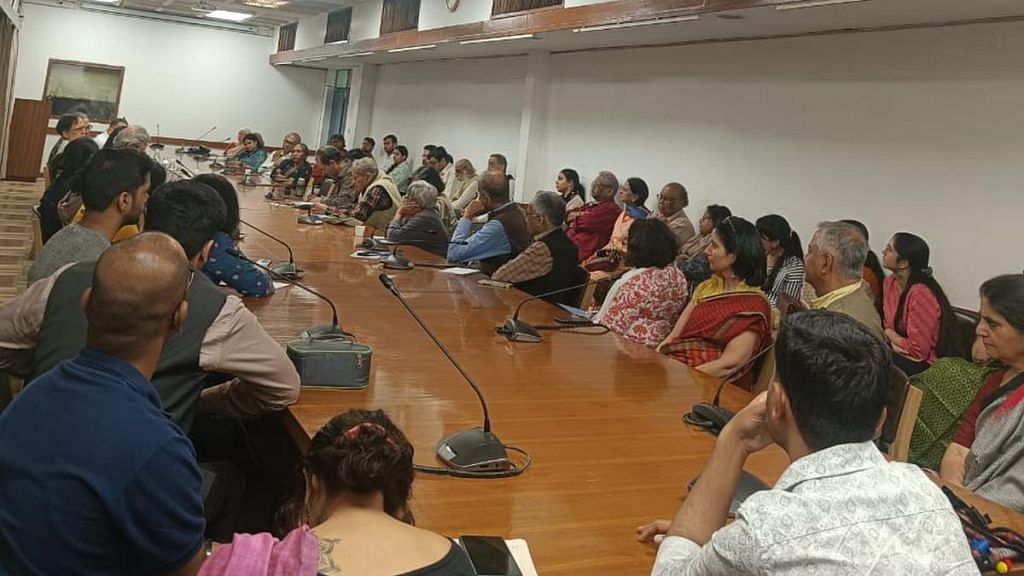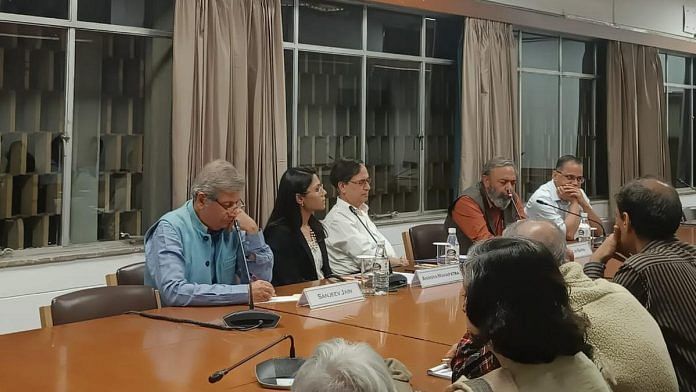New Delhi: In Saadat Hasan Manto’s 1955 short story, Toba Tek Singh, the protagonist Bishan Singh, a resident of the Lahore asylum, is selected to be relocated after an exchange of inmates between India and Pakistan. He grapples with a profound sense of displacement and ultimately dies in the no man’s land along the newly drawn border between the two countries. Psychiatrist and author Dr Sanjeev Jain uses this story as a metaphor for the liminal space occupied by the mentally ill. They’re trapped between institutions and a society rife with prejudice.
History and politics have a role to play in the psyche of a nation and the mental health of its people. Just how much so was the crux of a panel discussion, including psychiatrists Jain and Dr Alok Sarin, at Delhi’s India International Centre last month.
“Psychiatry and history are completely linked, because in our most formative discourse, psychiatry was called ‘the battle for the mind’. So why is it that psychiatrists did not engage with the political process of India?” said Jain, a professor of psychiatry at the National Institute of Mental Health and Neuro-Sciences, Bengaluru.
In a seminar room full of doctors and students, the panellists discussing how history and psychiatry inform each other also included historian Indivar Kamtekar, an associate professor at Jawaharlal Nehru University (JNU), and psychiatrist Dr Kaushik Sinha Deb from AIIMS.
Having jointly edited The Psychological Impact of the Partition of India (2018), Jain and Sarin questioned the silence around this bloody chapter in our history. They pointed out that the loss of life, the violence, and the displacement of millions not only affected the generation that experienced it, but echoed in their children and grandchildren.
“Psychiatrists don’t have to start doing history. Psychiatrists don’t have to become historians and historians don’t have to become psychiatrists. But psychiatry can be much better informed by our understanding of our disciplines,” said Sarin, consultant psychiatrist at Sitaram Bhartia Institute of Science and Research in New Delhi.
Also Read: 654 suicides & 50,000 resignations in 5 years — the crisis stalking India’s CAPFs
War and peace
Apart from Partition, other events like the Bengal Famine of 1943, the Bangladesh Liberation War in 1971, the 1918 Spanish Flu pandemic, and more recently, Covid-19 and the violence in Manipur have all impacted our collective mental health. How does a society heal?
To understand the impact of Partition, Kamtekar turned to historical records that show that the violence in Punjab was more gruesome than in Bengal. “Partition is often viewed as an issue of murders and mindsets. If I had to put it more provocatively, ‘Why were Punjabis more efficient murders than those in eastern India?” he asked.
Kamtekar answered his own question, referencing a report on the Punjab Boundary Force, which was disbanded shortly after Partition. He concluded that the gruesome efficiency of Punjab was due to the imprint of military training and organisation. “The ‘murder gangs’ were immobilised soldiers who used their recently acquired technical or organization skills and had weapons,” he said.
“People talk of Partition madness. But what I think one is able to show is that there is a submerged layer of organisation in what is easily mistaken for madness or chaos,” Kamtekar added.

A member of the audience also drew attention to the inadequacy of relying just on statistics to evaluate the impact of a historical event. He said that as a child he witnessed bodies being washed ashore daily during Partition. “The impact is deeper (than numbers),” he said.
Also Read: Delhi author talks of spiritual awakening. Scottish guru, milking cows played a role
Personal distress can be political
Rudolf Virchow, a prominent 19th-century German physician, famously argued that medicine is a social science, and politics is nothing more than medicine on a grand scale. This idea formed a cornerstone of the psychiatrists’ discussion. Like Virchow, Jain and Sarin are convinced that social inequality lies at the core of poor mental health outcomes. Physicians need to have a deep understanding of societal issues, they reiterated.
To get people talking and shatter the silence around mental health, Sarin and Jain have launched an online platform, The Canvas Askew that aims to bring together a wide range of professionals and other stakeholders connected to mental health—lawyers, writers, caregivers, policy makers, people with lived experiences.
It’s the online iteration of an initiative that Sarin and Jain started back in 2009 when they invited people from various professions to talk about the impact of mental illness. “It is an attempt to open up these conversations, it’s something that has been lacking and something that has been bothering us,” said Sarin.
The platform also makes papers and published works accessible. “That wider dialogue in a sense is what I think necessary. By listening to each other and by talking to each other, we can make our disciplines richer,” he added.
Jain questioned why psychiatrists do not engage with the political processes of India. He stressed on the need to analyse mental illness through the lens of history to see that murderers are not made in a day. There’s a dissonance, he suggested, between treating people’s inner battles and ignoring major historical events that cause widespread pain and trauma. “An individual person’s distress is the only political event that matters,” he said.
(Edited by Asavari Singh)



